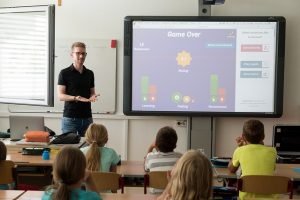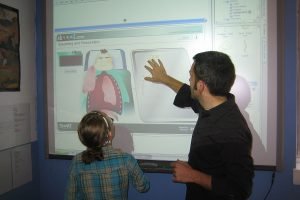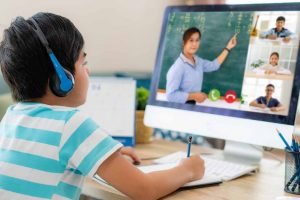” Bringing abstract ideas to life through Digital Automation “

By bringing abstract ideas to life, the multimedia content repository ENGAGES students and HELPS them PRACTICE via exercises, sample papers, and interactivities/simulations. The use of tools like topic summaries and concept maps can help students reinforce what they have learned. Students’ understanding of the subjects taught can be evaluated by teachers using both objective and subjective assessments. The themes can also be EXPLORED in greater depth by gifted students using resources like weblinks, practical applications, and assessment for learning.
Schools can adopt digital content by installing an ITBS, a CPU, a projection system, a finger-touch interactive board connected with a green board, and a strong cabinet. A variety of functions are available on the interactive white board, including text tools, document management tools, and drawing tools. With the use of these technologies, teachers may manage their lesson plans and notes easily while also effectively explaining concepts.
A server is installed inside the school and filled with digital learning and evaluation resources that are aligned with the course content. ITBS is installed, and classrooms are wired to the server. Teachers regularly access digital content in their classrooms, project it on the board during class, and use animations, graphics, video, and other multimedia to clarify concepts. You may use this with Linux and Windows.
An effective way to manage all of a school’s administrative chores is to use a set of tools called school ERP software. School ERP software, sometimes referred to as school management ERP software, takes care of all the time-consuming duties that previously needed to be handled by a specific person using pen and paper.
With the help of school ERP software, all parties involved—principals, management, instructors, and parents—can access any crucial information at any time. With the help of this software, educators can devote more time to instruction and student growth, parents can stay informed about the progress of their children, management can easily handle all the challenging and time-consuming administrative tasks, and principals can keep an eye on and control every single action taken.
Our product, Smartclass, is supported by a digital content repository with rich-media content for grades K–12 that has been organised to satisfy the national central and state boards’ specific objectives. It also incorporates compiled content from other partners, including Ebix Smartclass & Next Education, in addition to the rich-media content produced by our R&D team.
STEM education places a strong emphasis on a concept-driven approach that develops students’ analytical knowledge and problem-solving skills while encouraging them to strive for success in a variety of STEM-related professions. The idea that mathematics is a complex network of numbers and science, a maze of difficult theories, has persisted the entire time! Not any more, though! By incorporating these despised subjects into the curriculum using a cogent learning strategy based on the principles of STEM education, smartstemTM gives pupils a completely new perspective.
With the proper technology and skill set, smartstemTM equips educators and students to teach and master these subjects with joy, ease, and willingness. With the help of top-notch films and 2D and 3D simulations, smartstemTM breaks down complicated subjects into simple ideas. By utilising experiential learning simulations, vivid imagery, and glossaries, it guarantees improved retention rates.
smartstem™ is not only simple to use, but also simple to set up. It can be readily connected to and integrated with your current hardware because it is independently loaded on a hard disc and is therefore inexpensive. If required, you can provide the necessary supporting hardware.
Virtual Labs let students relate abstract concepts to real-life experiences. Our partner products Yenka and Crocodile clips provide simulations and activities that help students in understanding concepts and their application in real-life. Teachers can use the 3D visualization capabilities of these products to explain difficult concepts to students and bring it to life.
Yenka Math allows teachers to create 3D mathematical models to demonstrate statistics, probability, geometry and coordinates to students.
Yenka’s powerful virtual labs in Physics, Chemistry, and Technology are ideal for science lessons, demonstrating concepts colorfully in a safe, accurate virtual world.
The future smartCTILab Curriculum actively involves students at every stage to foster innovation, creativity, and problem-solving abilities in computer laboratories and classrooms. The curriculum introduces students to 21st-century technology and focuses on Computational Thinking (CT) abilities. Topics covered include the basics of computer science, robotics, creativity, problem-solving, and where they fit in the modern world. However, CT can also be used to promote problem solving across all academic fields, including math, science, and the humanities. CT is a problem-solving method that is crucial to the creation of computer applications. Our goal is to foster in kids a spirit of curiosity and experimentation so they won’t be frightened to try new things and learn from their mistakes.
Highlights of smart CTI lab :
Computer Science :
Robotics :
Creating Stories




Digital Transformation is a fundamental reality for businesses today
Digital transformation puts technology at the core of business strategy. This approach can reduce operating expenses and inefficiency
Copyright 2022 © Zirac India. Designed By CogZen Technologies